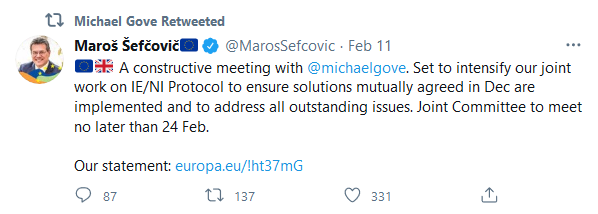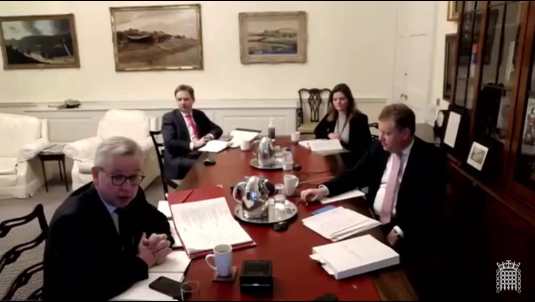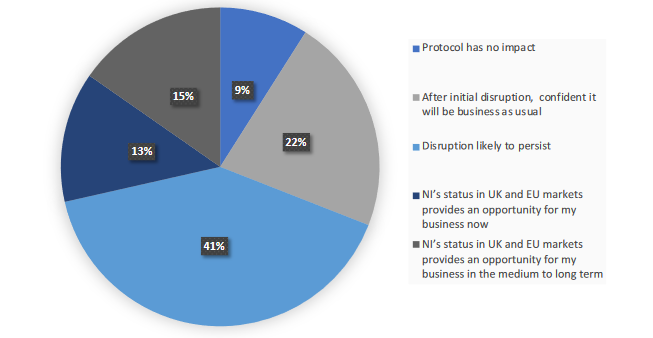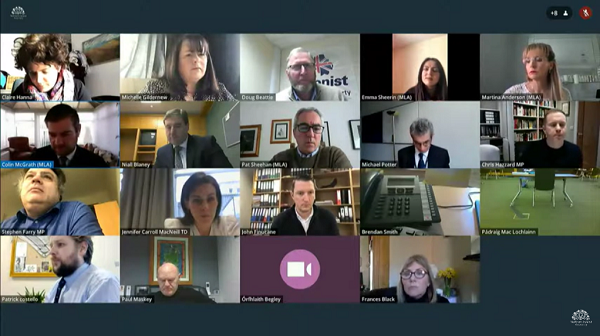Brexit Brief Newsletter
15 February 2021

Welcome to the 15 February 2021 newsletter
Following their exchange of letters on the Protocol on Ireland/Northern Ireland, European Commission and UK Government representatives met in London to find a way forward. Westminster Committees heard evidence from politicians and businesses on the new trading regime between the UK and EU, and how this affects Northern Ireland, while a survey finds that most manufacturers in NI want the Protocol to work. The European Commission is still receiving criticism for its proposal to trigger Article 16.
Gove and Šefčovič meet in London
Last week’s newsletter covered the letter from Chancellor of the Duchy of Lancaster, Michael Gove to Vice-President of the European Commission Maroš Šefčovič, requesting extensions and flexibilities around the implementation of the Protocol on Ireland/Northern Ireland.
Šefčovič responded to Gove in a letter on 10 February, calling the Protocol “a balanced outcome after years of difficult negotiations” which “requires full and faithful implementation by both Parties”. Šefčovič said Border Control Posts at NI ports are not yet fully operational, and that the UK has not granted EU representatives real-time access to its customs IT systems to monitor the agreed flexibilities. He believes these are “teething problems” which he is ready to address at the Joint Committee. Responding to Gove’s request for flexibilities, he said derogations cannot be agreed beyond what the Protocol foresees already, while further flexibilities on pet travel and plant movements would require the UK to align with the relevant EU rules. Šefčovič added he is keen to hear the views of stakeholders “on the ground”.

Source: Maroš Šefčovič on Twitter
The pair met in London the following day and released a joint statement, noting they had a “frank but constructive discussion” which took into account the views expressed by Northern Ireland’s First Minister and deputy First Minister. They agreed on their commitment to the proper implementation of the Protocol, and stated that work should intensify under the Specialised Committee to address the outstanding problems “with the shared objective to find workable solutions on the ground”. This would be bolstered by further engagement with business groups and civic society in Northern Ireland. The Joint Committee will formally meet before 24 February.
Scrutiny of the Protocol
The Joint Consultative Working Group (JCWG), which sits under the Joint Committee as part of the governance structure of the Withdrawal Agreement and Protocol on Ireland/Northern Ireland met on 29 January. This information was delivered by Paymaster General Penny Mordaunt on 1 February, but no further detail on the attendees or agenda was given.
The function of the JCWG is outlined in the Protocol to “serve as a forum for the exchange of information and mutual consultation”, including in relation to the implementation of EU law in Northern Ireland, and amendments or replacements to applicable EU legislation. The UK Government has previously stated that NI Executive officials will be invited to attend these meetings as part of the UK delegation.
Gove and Frost appear before Select Committees
Gove appeared before the Commons EU Scrutiny Committee on Monday 8 February, where he told MPs that the Protocol “is not working at the moment; it can be made to work”. He said he has been engaging with parties in Northern Ireland, and with the Irish Government.
The following day Gove and David Frost appeared before the Lords EU Committee. Frost is now the Prime Minister’s Representative on Brexit and International Policy, and previously led the trade negotiations with the EU. Ever fond of colourful language, Gove likened the current state of UK-EU relations to an aeroplane taking off: “Eventually, you reach a cruising altitude and the crew tell you to take your seatbelts off and enjoy a gin and tonic and some peanuts. We are not at the gin and tonic and peanuts stage yet, but I am confident we will be.”

Gove speaking to the Lords EU Committee | Source: UK Parliament
Gove said he would respond to the DUP’s five-point plan in opposition to the Protocol with “close attention and courtesy”. He questioned some of the procedures now required to protect the EU single market, saying “if you send a bulb from Bedfordshire to Ballymena, in order to plant it in your back garden, that is not an existential threat to the single market.”
Frost told the Committee that they had heard informally from the Commission that there will likely be a formal request to extend the two-month ratification period for the Trade and Cooperation Agreement. On Wednesday, the European Commission announced it had adopted a proposal to extend the ratification period until 30 April 2021. The Commission states that this is a technical extension to give time “for the completion of the legal-linguistic revision of the Agreement in all 24 languages for its scrutiny by the European Parliament and the Council”. The EU-UK Joint Partnership Council, established by the TCA and co-chaired by the EU and the UK, needs to jointly agree a decision on this extension. While the EU representation on the Partnership Council has been announced, the UK representation has not yet been confirmed.
Manufacturing NI report: ‘Manufacturers want the Protocol to work’
Manufacturing NI has released a report ‘NI’s manufacturers and the first month of the NI Protocol’ based on the findings of a survey of 355 manufacturing businesses about their experience in the first month of the new trading arrangements. It reports significant disruption as the transition period ended, with “absence of detail and time, uncertainty on our status and that of our goods, and political instability all contributing to a month of turbulence”. Manufacturing companies also raised concerns about tariffs, the ‘at risk’ test, additional costs for material and logistics, and disadvantageous migration rules. The survey found support for EU and UK alignment on agri-food (SPS) rules to remove regulatory barriers in the Irish Sea.
The organisation states that despite the difficulties in January, “it is clear from the survey findings that most manufacturers want the Protocol to work.” Companies were asked about confidence for the year ahead, given the context of the pandemic and their experience in the first month:

Confidence of manufacturing businesses for the year ahead | Source: Manufacturing NI
Manufacturers are asking the UK and EU to deliver mitigations, derogations, and compensation to make the Protocol work. The report calls on the UK and EU to educate customers and suppliers about the status of NI goods, and work to simplify or provide maximum flexibility on Irish Sea controls and processes. It calls on the NI Executive to “provide the necessary political stability” and identify and secure new opportunities. The report notes that almost 20% of respondents said the Protocol should be replaced; this figure was 16% in summer 2020. 30% said the NI Executive should identify and secure new trading opportunities. The survey is set to be repeated in three months.
MPs hear from customs, port, and freight sectors
The House of Commons NI Affairs Committee held a session on 10 February with port operators, haulage companies, and customs agents. The first days under the Protocol were described as a ‘blizzard’, and a steep learning curve. However, witnesses noted that there have been improvements: business is getting used to what is required, and the industry is resilient. DAERA officials were praised for their helpfulness, while the Trader Support Service was criticised for its lack of expertise. Witnesses raised their concerns over impending supplementary declarations and potential tariffs and agreed that a time-limited extension to the grace period would be welcome.
NI Ministers questioned on the Protocol
On Monday 8 February First Minister Arlene Foster answered questions in the Assembly on behalf of the Executive Office. Referring to the EU’s proposal to trigger Article 16 to restrict vaccine exports, she said “it was a bit of a Freudian slip from the European Commission”. She went on to say that the unfettered access promised by the Prime Minister is not happening, so he “needs to use all legal instruments at his disposal to deal with these issues. That is what we are calling on him to do.”

First Minister Arlene Foster speaking to the Assembly | Source: NI Assembly
Minister for Agriculture, Environment and Rural Affairs Gordon Lyons took questions from MLAs on the decision to temporarily stand down staff at ports. He told MLAs that his department was considering the threat assessment received from the PSNI, alongside DAERA’s own risk assessment and potential mitigations which could be put in place. He stated there would be further engagement with staff and trade unions. John O’Dowd of Sinn Féin accused Lyons of “allowing non-existent threats to carry forward a political agenda, contrary to your statutory duty and the ministerial code”. Lyons responded by arguing that the response is “entirely appropriate” and that staff safety comes first. On Wednesday, staff returned to work at ports. The Committee for Agriculture, Environment and Rural Affairs agreed at their meeting on Thursday to investigate this matter.
Von der Leyen addresses MEPs
European Commission President Ursula von der Leyen spoke to the European Parliament on 10 February in a debate on the EU’s Covid-19 vaccine strategy. She addressed the debacle over the Commission’s proposed use of Article 16 to limit vaccine exports: “The bottom line is that mistakes were made in the process leading up to the decision, and I deeply regret that. But, in the end, we got it right, and I can reassure you that my Commission will do its utmost to protect the peace of Northern Ireland, just as it has done throughout the entire Brexit process.”

Von der Leyen speaking to the European Parliament | Source: European Union, 2021
Irish MEPs were critical of the Commission’s approach and sought reassurance that such a situation would not be repeated. Billy Kelleher (Fianna Fáil) said, “We are playing with a very sensitive issue on the island of Ireland so I would greatly appreciate answers to those three questions: how, who and why?” Sean Kelly (Fine Gael) agreed: “We need assurances that lessons have been learned and that sufficient procedures are being put in place to ensure that this cannot happen again.”
While their remarks went unanswered in the plenary, RTÉ reported earlier in the week that Irish officials were meeting with senior European Commission officials to establish an alert system so any issues caused by Northern Ireland’s new arrangements can be identified early and avoided.
Eight Irish MEPs have signed a letter to the Presidents of the European Council, Commission and Parliament, calling for “connective tissue” to be developed between NI and the EU. The letter points out that under the Protocol, NI continues to follow many EU rules without representation in the EU decision-making structures. It suggests various ways to increase links between the EU and NI, arguing there is “a real risk that EU legislation affecting Northern Ireland will not be properly scrutinised at an early enough stage” which will feed into a narrative that the Protocol is undemocratic and lacking in accountability.
European Commission assesses impact of trade deal
The European Commission has published its Winter 2021 interim economic forecast. The forecast includes an analysis of the short-term economic impact of the EU-UK Trade and Cooperation Agreement. It finds that the UK’s exit under the TCA is estimated to generate an output loss of around 0.5 % of GDP by the end of 2022 for the EU. This figure is estimated to be around 2.25% point for the UK. Compared to trading on World Trade Organisation Terms, modelling suggests the EU-UK TCA reduces the negative impact for the EU by about 1/3 on average and for the UK by about 1/4. The paper notes that “there is a significant increase in [non-tariff barriers] NTBs for both goods and services”. The Commission concludes that while the TCA is better than no trade agreement, “it cannot come close to matching the benefits of the trading relations provided by EU membership”.
Assembly and Oireachtas Committees meet to discuss Brexit
On Wednesday 10 February, the Committee for the Executive office held a session with the Joint Committee on the Implementation of the Good Friday Agreement (JCIGFA). The Oireachtas Committee is also attended by some MPs from constituencies in Northern Ireland. Several attendees expressed disappointment that the DUP had decided not to participate the joint session. Discussions on Brexit included the Common Travel Area between the UK and Ireland, and implications for cross-border workers. Doug Beattie MLA (UUP) said that "There are frictions and instabilities at this moment in time and we cannot just bat them away and ignore them. We are going to have to address them.” Claire Hanna MP (SDLP) pointed out that "the reality is that frictions in the Irish Sea are more manageable than frictions on the land in terms of business flow and the flow of people."

The Committee for the Executive Office session with the Joint Committee on the Implementation of the Good Friday Agreement | Source: NI Assembly
Later the Committee had a briefing from Executive Office officials on Article 2 of the Protocol on Ireland/Northern Ireland. A briefing on the Executive’s International Relations and comparisons with Scotland and Wales followed.

Article 2 of the Protocol on Ireland/Northern Ireland | Source: UK Government
Other news
- Alliance Party MP Stephen Farry has written to the UK Government and European Commission calling for a veterinary agreement to reduce pressures and regulatory barriers in agri-food trade.
- The House of Lords Common Frameworks Scrutiny Committee heard evidence from members of the Scottish, Welsh, and UK Parliaments, who outlined their perspective on the Common Frameworks process. Concerns were raised about the transparency of the process, and opportunities for stakeholder engagement and sufficient scrutiny. The interoperability of frameworks with other legislation, such as the Continuity Act in Scotland, was also discussed.
- The UK Government has announced a £20 million ‘Brexit Support Fund’ for small and medium sized businesses in GB. Traders will be able to apply for grants up to £2,000 in order to support them in preparation for new import controls which the UK will introduce in April and July, as set out in the Border Operating Model. Northern Ireland businesses do not face the same procedures when trading with the EU.
- The UK Government has published its response to the Intelligence and Security Committee report, ‘Northern Ireland-Related Terrorism'. The Government response underlines the Protocol as a solution to avoid a hard border on the island of Ireland, and that its approach to the Protocol “will be guided at all times by our overall aims of preserving and strengthening Northern Ireland’s place in our United Kingdom, and of protecting the huge gains from the peace process”. It favours a “consensual, pragmatic and proportionate approach” to implementing the Protocol.
This Week at the Assembly
- Tuesday 16 February, 10.40 am – Plenary - Question Time: Economy
- Wednesday 17 February, 10.10 am - Committee for Infrastructure - Briefing from all Northern Ireland Ports - Brexit & Current Issues; Briefing from Retail NI - Brexit & COVID Issues
- Wednesday 17 February, 11.55 am - Committee for the Economy - ESF Succession Project - Departmental Written Briefing
- Thursday 18 February, 10.25 am - Committee for Agriculture, Environment and Rural Affairs - Legislation relating to EU Exit
- Thursday 18 February, 2 pm - Committee for Justice - EU Exit and Justice related issues - Update – written paper
Catch up with the Committees
- Monday 8 Feb, 2PM, Plenary - Question Time: The Executive Office; Agriculture, Environment and Rural Affairs
- Wednesday 10 Feb, 2 PM - Committee for The Executive Office – Brexit: meeting with Joint Committee on the Implementation of the Good Friday Agreement; Brexit: Article 2 of the Protocol on Ireland/Northern Ireland - Oral evidence session with departmental officials; The Executive’s International Relations and comparisons with Scotland and Wales - Research and Information Service Briefing
- Thursday 11 Feb, 10.25 AM - Committee for Agriculture, Environment and Rural Affairs - Supplementary Legislative Consent Memorandum for the Environment Bill; EU Transition Fortnightly Update – Briefings from DAERA



